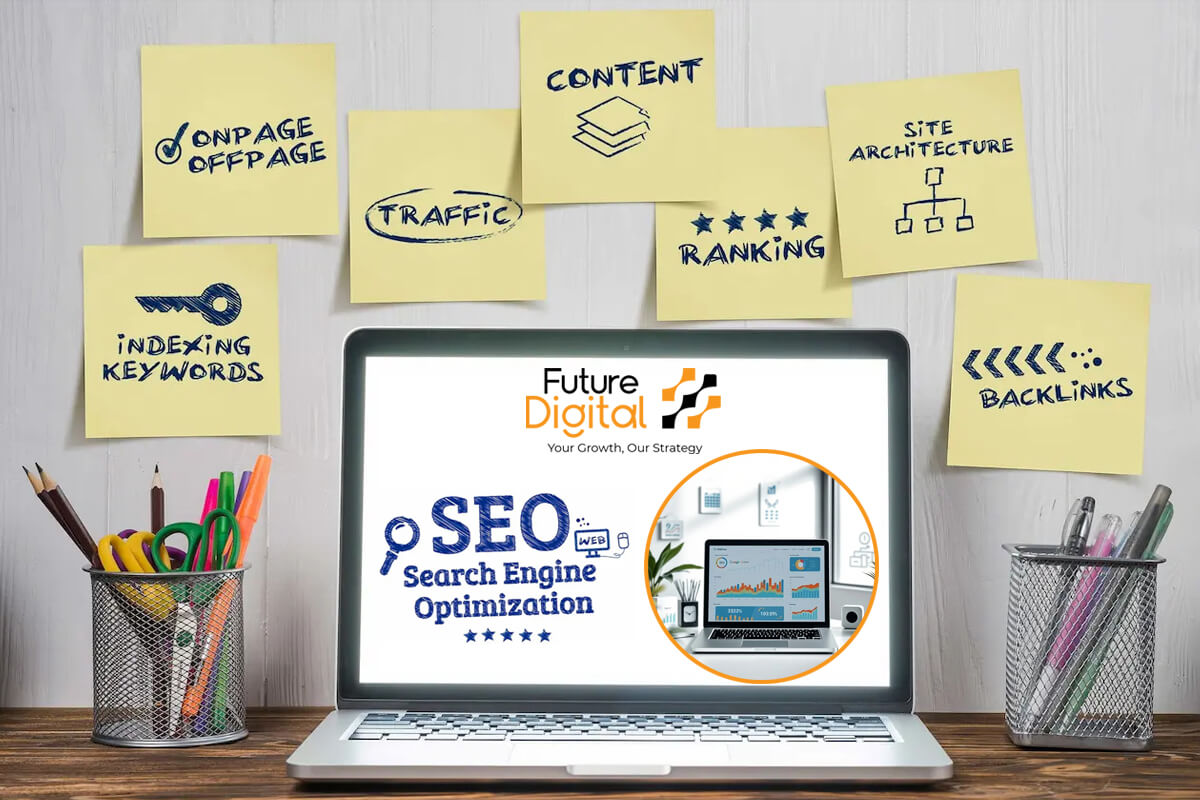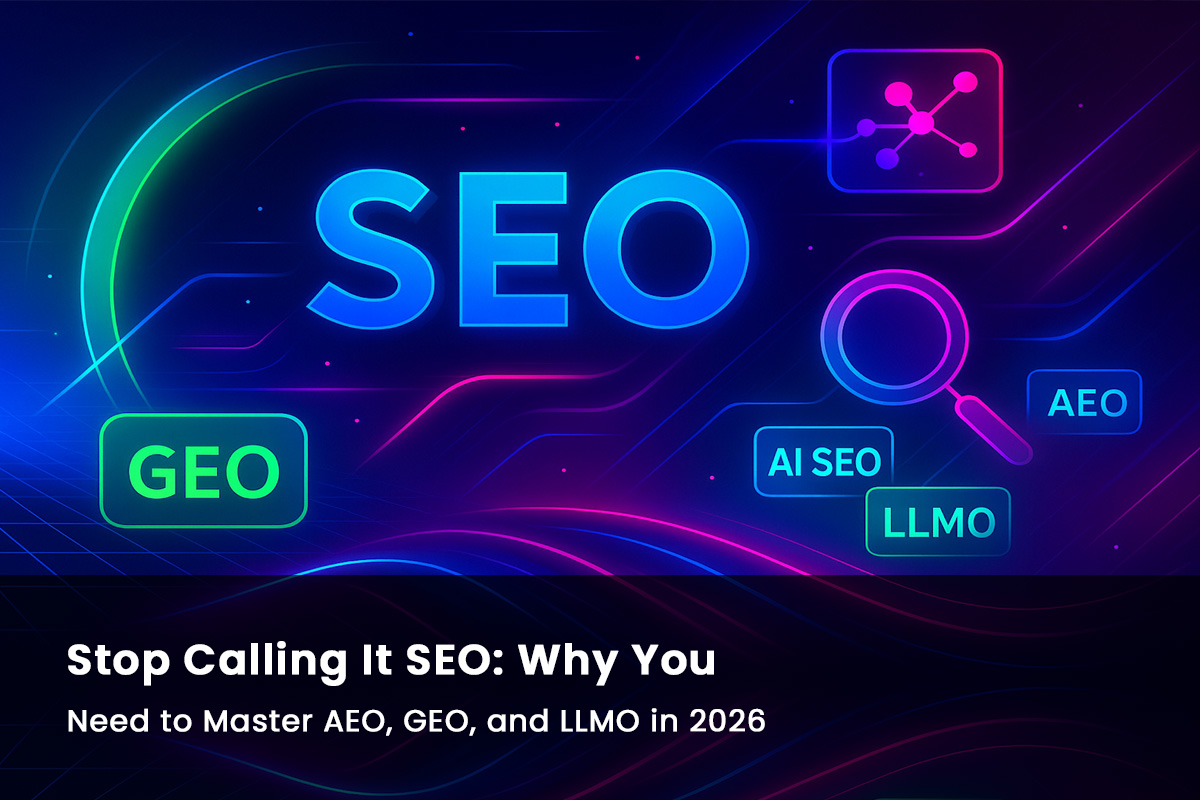SEO Trends to Watch in Future:
What Your Agency Should Be
Focusing On
 14 May
14 May
Table of Contents
- Introduction
- Artificial Intelligence and Machine Learning in SEO
- Voice Search Optimization
- Core Web Vitals and Page Experience Signals
- Mobile-First Indexing
- E-A-T and Content Quality
- Video SEO: The Power of Visual Content
- Featured Snippets and Position Zero
- Local SEO and Google My Business Optimisation
- Data Privacy and Ethical Marketing
- Conclusion
- FAQs
The world of Search Engine Optimisation (SEO) is constantly evolving, and keeping up with these changes is essential for businesses that want to remain competitive in the digital landscape. As algorithms become more sophisticated and user behaviour changes, SEO strategies must adapt to stay relevant. If you're running a digital marketing agency or are responsible for your company's SEO strategy, staying ahead of the curve is crucial. This article will explore the top SEO trends to watch for the future and provide actionable insights on how your agency can capitalize on them.
Artificial Intelligence and Machine Learning in SEO
Artificial Intelligence (AI) and Machine Learning (ML) are transforming the digital marketing landscape, and SEO is no exception. Google's algorithms, particularly RankBrain and BERT, are powered by AI and ML, enabling search engines to understand context, user intent, and semantic search better than ever before. These technologies make SEO smarter, and your agency needs to know how to optimize for them.
What Your Agency Should Do:
- Focus on user intent:
Create content that answers specific questions and addresses user intent. - Use AI-powered tools:
Analyze search trends and automate repetitive tasks. - Ensure natural language usage:
Craft content that aligns with how AI interprets modern search queries.
Voice Search Optimization
The rise of smart speakers and voice assistants like Google Assistant, Siri, and Alexa is changing how people search. Voice search is expected to account for 50% of all searches by 2025. Voice search queries are usually longer and more conversational, so traditional SEO strategies may need to be adjusted.
What Your Agency Should Do:
- Optimize for conversational keywords: Focus on natural language that mirrors how people speak.
- Focus on local SEO: Voice search queries often include “near me” or location-specific phrases.
- Create FAQ-style content: Address common questions directly to improve voice search visibility.
Core Web Vitals and Page Experience Signals
Google has placed increasing importance on Core Web Vitals and page experience as ranking factors. These metrics focus on web pages' loading performance, interactivity, and visual stability. Websites that offer an exceptional user experience will see better rankings in search results.
What Your Agency Should Do:
- Monitor Core Web Vitals regularly: Use Google Search Console and tools like PageSpeed Insights to track performance.
- Improve key performance metrics: Reduce page load times, minimize layout shifts, and enhance mobile responsiveness.
- Enhance UX/UI design: Use structured data and ensure intuitive, visually stable, and engaging interfaces for users.
Mobile-First Indexing
Google switched to mobile-first indexing in 2020, meaning that it primarily uses a website's mobile version for indexing and ranking. Given the growing use of smartphones, ensuring your website is optimized for mobile is now a critical aspect of SEO.
What Your Agency Should Do:
- Ensure mobile optimization: Make sure all pages are responsive and user-friendly on mobile devices.
- Focus on fast loading speeds: Optimize images, scripts, and other elements for quick mobile performance.
- Test for mobile-friendliness: Use Google’s Mobile-Friendly Test tool to evaluate and improve usability.
E-A-T and Content Quality
Google's focus on Expertise, Authoritativeness, and Trustworthiness (E-A-T) continues to shape how content ranks in search results. Google prioritizes high-quality content from credible sources and is improving at identifying authoritative content, particularly in sectors like health, finance, and law.
What Your Agency Should Do:
- Invest in high-quality content: Use well-researched material from reputable sources and field experts.
- Showcase qualified professionals: Ensure industry experts write or review the content to provide genuine value.
- Build brand authority: Earn backlinks from high-quality, authoritative websites to enhance credibility.
Video SEO: The Power of Visual Content
With video consumption skyrocketing, video SEO has become a significant ranking factor. YouTube, the second-largest search engine, is now an essential platform for businesses looking to drive organic traffic. Video is also increasingly appearing in rich snippets and Google's featured snippets.
What Your Agency Should Do:
- Optimise video content: Include keyword-rich titles, descriptions, and tags.
- Use transcripts and captions: Make videos more accessible and enhance their SEO value.
- Leverage YouTube SEO: Ensure your videos are well-optimized and linked back to your website or blog.
Featured Snippets and Position Zero
Featured snippets (the boxed information that appears at the top of some search results) are prime real estate in search engine results pages (SERPs). Optimizing content to appear in these snippets (known as Position Zero) is becoming a key priority for SEO.
What Your Agency Should Do:
- Target long-tail and question-based keywords: Focus on how users phrase search queries.
- Use structured data (Schema Markup): Improve how search engines understand and display your content.
- Create concise, organized content: Use headings, bullet points, and lists to directly answer common questions.
Local SEO and Google My Business Optimisation
Local SEO is crucial for businesses that operate in specific regions. Google My Business (GMB) continues to be a critical tool for local companies, providing visibility in local search results and Google Maps. As more people use mobile devices to search for nearby services, optimizing for local search is necessary for any digital marketing agency.
What Your Agency Should Do:
- Optimise and update GMB listings: Ensure your business information is accurate and up to date.
- Encourage local reviews: Positive ratings from local customers boost trust and visibility.
- Use location-based keywords: Tailor content to specific regions to capture local search traffic.
Data Privacy and Ethical Marketing
As data privacy laws like GDPR and the UAE's data protection regulations become stricter, businesses must collect and handle consumer data responsibly. Consumers are increasingly concerned about how their personal information is used, and marketers need to be transparent about their data practices.
What Your Agency Should Do:
- Stay compliant: Keep up to date with data privacy laws and ensure all marketing efforts adhere to them.
- Practice transparency: Clearly explain what data is collected and how it will be used to gain customer trust.
- Build trust through ethics: Focus on ethical marketing practices and educate customers about their data rights.
Conclusion
The future of SEO in the UAE is bright and filled with exciting new trends to reshape how businesses approach digital marketing. From AI-driven strategies and voice search optimization to the power of video content and the continued importance of local SEO, staying on top of these trends will help ensure your digital marketing efforts are successful in the ever-evolving digital landscape. Agencies in the UAE need to be proactive in adapting to these changes to drive business growth and maintain a competitive edge.
At Future Digital, we specialize in helping businesses navigate these changes, providing innovative, data-driven, and future-ready SEO strategies. We can help your business achieve sustainable digital growth and long-term success by staying on top of the latest trends.
our popular faqs
Answers to Your Most
Asked Questions
What are the key SEO trends that will shape the future of digital marketing in the UAE?
As SEO continues to evolve, several trends are poised to shape the future of digital marketing in the UAE. These include:
- Artificial Intelligence (AI) in SEO: AI-powered algorithms are revolutionizing how search engines interpret user intent, offering advanced personalization, predictive analytics, and content optimization.
- Voice Search Optimization: With the rise of voice assistants like Google Assistant, Alexa, and Siri, businesses need to adapt by focusing on conversational and question-based keywords that are common in voice searches.
- Short-Form Video and Social Media Marketing: Platforms like TikTok, Instagram Reels, and YouTube Shorts are becoming essential for SEO, driving user engagement and offering businesses a creative way to connect with audiences.
- E-commerce and Mobile SEO: With the growth of online shopping, optimizing websites for mobile devices and ensuring fast e-commerce experiences are vital. Mobile-first indexing by Google makes this a top priority for businesses.
- Content Quality and E-A-T: Google's emphasis on Expertise, Authoritativeness, and Trustworthiness (E-A-T) will continue to drive content quality, requiring businesses to focus on authoritative, high-quality content to rank higher in search results.
How does Artificial Intelligence (AI) impact SEO, and how can it be leveraged?
AI is significantly transforming SEO by enhancing how search engines interpret and rank content. Here are the key ways AI impacts SEO:
- Personalization: AI analyzes user data to provide tailored content and recommendations, leading to better engagement and higher conversion rates.
- Content Optimization: AI tools can create relevant, high-quality content that ranks well by improving keyword usage, structure, and relevance.
- Predictive Analytics: AI can predict consumer behavior and trends, helping businesses create content that targets the right audience at the right time.
- Automation: Many SEO tasks like keyword research, backlink analysis, and content creation can be automated using AI, freeing up time for strategic work.
To leverage AI in SEO, businesses should invest in AI-powered tools that assist with content creation, keyword optimization, and user behavior analysis to drive better results.
Why is voice search becoming important in SEO, and how should businesses optimize for it?
Voice search is growing rapidly due to the widespread adoption of smart speakers and voice assistants like Alexa, Siri, and Google Assistant. This trend is also gaining momentum in the UAE, where convenience and speed are valued.
Why Voice Search is Important:
- Conversational Queries: Voice searches tend to be longer and more conversational than text-based searches. Businesses must focus on natural language and question-based keywords to optimize for voice search.
- Mobile Usage: Most voice searches happen on mobile devices, and with the UAE’s high mobile penetration, optimizing for voice search is essential.
- Local SEO: Many voice searches are location-based, such as "restaurants near me." Businesses that serve specific areas need to optimize their content for local SEO to attract these searches.
How to Optimize for Voice Search:
- Focus on long-tail keywords and phrases that reflect natural, conversational speech.
- Ensure your website is mobile-friendly and loads quickly on all devices.
- Use structured data (Schema markup) to help search engines understand your content better and increase visibility in voice search results.
- Create FAQ-style content that answers common questions in a conversational manner.
How does influencer marketing impact SEO in the UAE, and why should businesses embrace it?
Influencer marketing has become a powerful tool for building brand awareness and engagement in the UAE. While not directly linked to traditional SEO, it has several impacts on SEO:
- Backlinking and Referral Traffic: Influencers often provide backlinks to businesses through their blogs, social media profiles, and websites. These high-quality backlinks help improve domain authority and organic rankings.
- Social Signals: Engagement on social media, such as likes, shares, and comments, can influence SEO rankings. Influencers help increase social signals that search engines now consider in ranking algorithms.
- Content Creation: Collaborating with influencers creates high-quality, engaging content that resonates with your target audience. This improves user experience and encourages longer site visits, which can positively impact SEO.
- Audience Trust and Credibility: Influencers have established trust with their followers, and their endorsement can significantly boost a brand's credibility and trustworthiness—factors that are vital for SEO rankings.
For these reasons, businesses in the UAE should embrace influencer marketing as part of their broader SEO strategy.
How do video content and storytelling contribute to SEO success in the UAE?
Video content and storytelling play a crucial role in SEO by increasing user engagement, a critical ranking factor for search engines. Here’s how they contribute:
- Higher Engagement: Video content is more engaging and shareable, which increases user interaction and the time spent on your site. Longer site visits lead to higher rankings.
- Appealing to Mobile Users: Video is popular on mobile devices. Optimizing videos for mobile viewing can positively impact your SEO performance.
- Rich Snippets: Video content often appears as rich snippets (such as video carousels) in search results, enhancing visibility and attracting more clicks.
- Storytelling Drives Emotional Connection: Storytelling helps build emotional connections with your audience, fostering brand loyalty. Google favors content that is relevant, engaging, and valuable to users.
Tips for Video SEO:
- Use descriptive titles and video descriptions with relevant keywords to improve searchability.
- Include transcripts or captions to improve accessibility and help search engines index your video content more effectively.
- Ensure videos are optimized for mobile viewing and load quickly on all devices.
How important is data privacy for SEO, and how should businesses approach it?
Data privacy has become a critical issue for businesses and consumers alike, particularly with stricter regulations like GDPR and the UAE's data protection laws. As SEO heavily relies on data, it’s important for businesses to adopt ethical data practices to protect user privacy and foster trust.
Why Data Privacy Matters:
- Consumer Trust: Users are more likely to engage with brands that prioritize their privacy and handle data responsibly. Failing to protect data can lead to trust loss and negatively impact SEO.
- Compliance with Laws: Businesses must comply with data privacy regulations to avoid fines and legal repercussions. Non-compliance can damage a brand’s reputation and SEO rankings.
- Personalized Marketing: While personalization boosts SEO, businesses must balance this with respect for data privacy to avoid breaching trust and violating privacy laws.
How to Approach Data Privacy in SEO:
- Ensure that clear consent is obtained before collecting personal data, especially for email marketing and retargeting campaigns.
- Be transparent about how data is collected, used, and stored.
- Implement SSL certificates and encryption to secure user data on your website.
- Stay updated on data privacy regulations to ensure all marketing practices comply.





